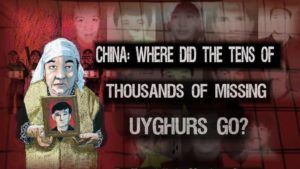
China says it will welcome UN officials to visit Muslim-majority region of Xinjiang, following reports that the regime has incarcerated as many as one million Uyghurs in indoctrination camps. Beijing claims UN observers can visit the region if proper procedures are followed.
The concession coincides with reports that the Communist authorities have passed a law to ‘make Islam more compatible with socialism.’
The mass detention of some of China’s most accomplished Uyghurs has become an alarming symbol of the Communist Party’s most intense social-engineering drive in decades, according to scholars, human rights advocates and exiled Uyghurs, The New York Times reports:
The Chinese government has described the detentions as a job training program aimed at providing employment opportunities for some of the country’s poorest people. But a list of more than 100 detained Uyghur scholars compiled by exiles includes many prominent poets and writers, university heads and professors of everything from anthropology to Uighur history.
 “The fact that highly educated intellectuals and academics and scientists and software engineers are being held in these facilities is one of the best counterarguments to authorities’ claims that this is some kind of educational program meant to benefit Uyghurs,” said Maya Wang, a Hong Kong-based researcher for Human Rights Watch.
“The fact that highly educated intellectuals and academics and scientists and software engineers are being held in these facilities is one of the best counterarguments to authorities’ claims that this is some kind of educational program meant to benefit Uyghurs,” said Maya Wang, a Hong Kong-based researcher for Human Rights Watch.
China’s actions in the XUAR “deserve the censure of the international community,” said a recent report from the Canadian House of Commons:
The actions of the Government of China will have an irreversible impact on the lives of Uyghurs and Turkic Muslims in the XUAR and abroad, and their survival of a community. To protect these vulnerable minorities, it is essential to expose the Government of China’s actions for what they are: a campaign of assimilation unprecedented in its scale and sophistication. The trampling of human rights and civil liberties of millions of Turkic Muslims is never justifiable, whether it is in pursuit of security, economic development or any other interest.
“Witnesses detailed the manner in which Chinese authorities have begun to associate all outward expressions of Islam or the Uyghur identity as being evidence of Islamic extremism,” the report added. “This has led to the suppression of Uyghur life in the XUAR, where Turkic Muslim residents are subject to political indoctrination supported by an overwhelming police presence making unprecedented use of mass surveillance technology.”
 Radio Free Asia’s Uyghur Service has consistently documented the worsening human rights situation in China’s Far West, also known as the Xinjiang Uyghur Autonomous Region (XUAR)through its journalism in one of the world’s most difficult media environments, the National Endowment for Democracy reports.
Radio Free Asia’s Uyghur Service has consistently documented the worsening human rights situation in China’s Far West, also known as the Xinjiang Uyghur Autonomous Region (XUAR)through its journalism in one of the world’s most difficult media environments, the National Endowment for Democracy reports.
The detained scholars offered a moderate path, where Uyghurs could maintain religious and cultural practices without turning to extreme and isolationist ideas, said Rune Steenberg, a postdoctoral researcher at the University of Copenhagen.
“This is the really big tragedy about the clampdown,” Dr. Steenberg said. “They were actually bridge builders of integration of broader Uyghur society into modern Chinese society and economy.”
The exposure of the camps has forced China to conduct a sharp power PR offensive.
Tahir Hamut, a Uighur poet who lives in Virginia, began working with other Uighur exiles to

Change.org
collect the names of those detained over the past year based on news reports and information from families and classmates. The list has now grown to 159 Uighurs and five others from other minority groups, The Times adds.
“These people are all the most prestigious in Xinjiang,” Mr. Hamut said. “They are models who all study diligently and raise themselves up. Their arrest is a great injury, a great attack to all Uyghurs.”
The Uyghur issue is the latest demonstration that Beijing’s foreign policy is increasingly tone deaf, observers suggest.
The repression reflects a pattern that has repeated itself in the far western region, The Times adds:
The authorities targeted Uighur intellectuals after the People’s Liberation Army occupied Xinjiang in 1949, and even before in the late 1930s, when Xinjiang was ruled by a Soviet-backed warlord, said Ondrej Klimes, a researcher with the Oriental Institute of the Czech Academy of Sciences who studies Xinjiang and the Uyghurs.
“It makes the community easier to be subjugated, more cooperative, more docile,” Dr. Klimes said. “You have this whenever an authoritarian regime comes, they first target intellectuals.”







